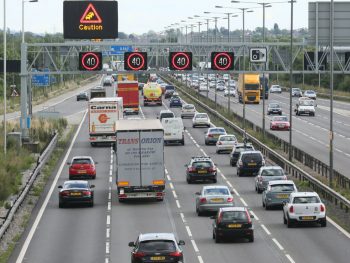Scrap all existing smart motorways, say safety campaigners
Campaigners are calling for all existing smart motorways in the UK to be scrapped after the Government cancelled plans to build 14 new schemes due to safety and cost concerns.

Around 10% of England’s motorway network is made up of smart motorways
Prime Minister Rishi Sunak confirmed Saturday (15 April) that smart motorways earmarked for construction during the third Road Investment Strategy (2025 to 2030) and the schemes previously paused will now not go ahead.
The Department for Transport said the move recognised the current lack of public confidence felt by drivers as well as financial pressures.
Around 10% of England’s motorway network is made up of smart motorways – these include ‘all lane running’ schemes where the hard shoulder has been permanently converted to a live lane and ‘dynamic hard shoulder’ where the active lane only operates part-time.
Initial estimations suggest constructing future smart motorway schemes would have cost more than £1bn – and the Government said cancelling these schemes would allow more time to track public confidence in smart motorways over a longer period.
It follows years of lobbying by motoring groups and road safety campaigners.
The construction of smart motorways had already been put on hold in January 2022 to gather more safety data on their operation after a damning report by the Transport Committee.
Rishi Sunak, who pledged to ban smart motorways during his leadership campaign, said: “Many people across the country rely on driving to get to work, to take their children to school and go about their daily lives and I want them to be able to do so with full confidence that the roads they drive on are safe.”
However, while no new stretches of road will be converted into smart motorways, the M56 J6-8 and M6 J21a-26 will be completed as they are already over three-quarters constructed.
Existing smart motorways will continue to get safety improvements, including 150 extra emergency refuge areas and technology to spot broken-down vehicles under a previously announced £900m package.
The move to scrap new schemes has been welcomed by some road safety campaigners. Meera Naran, whose 8-year-old son Dev died in a motorway collision on the M6 in 2018, said: “Since successfully campaigning for the 18-point action plan, £900m commitment and the pause in the rollout in January 2022, there has been a lot of joined-up thinking in mutually coming to this decision.
“I thank ministers and executives for inviting me to work alongside them in memory of Dev, towards a mutual goal and for their commitment over the years.”
And RAC road safety spokesman Simon Williams said it was a “watershed announcement”. He added: “Our research shows all lane running smart motorways are deeply unpopular with drivers so we’re pleased the Government has finally arrived at the same conclusion. It’s now vitally important that plans are made for making the hundreds of existing miles of these types of motorway as safe as possible. The possibility of converting all lane running stretches to the ‘dynamic hard shoulder’ configuration, where the hard shoulder is open and closed depending on the levels of traffic, could be one option the Government considers.”
But the AA has called for all existing schemes to now be converted back to permanent hard shoulders.
Speaking to the BBC, Edmund King, president of the AA, said: “Basically drivers don’t trust them, the technology is not fool-proof, and 37% of breakdowns on smart motorways happen in live lanes. And basically those drivers are sitting ducks.”
Claire Mercer, whose husband Jason Mercer was killed on a smart motorway in South Yorkshire in 2019, is also campaigning for further action.
She commented: “I’m particularly happy that it’s been confirmed that the routes that are in planning, in progress, have also been cancelled. I didn’t think they’d do that.
“So, it’s good news, but obviously it’s the existing ones that are killing us. And I’m not settling for more emergency refuge areas.”
Joshua Hughes, partner and head of the Complex Injury Team at solicitors Bolt Burdon Kemp, said: “There is no definitive data to determine whether smart motorways are more dangerous than conventional ones but high-profile fatalities whereby drivers have become stranded in a live-lane before having collisions have contributed to a low degree of driver confidence in them. This has made their wider implementation very difficult.
“Smart motorways are legally workable but the problem for Government is that in their current form they are unlikely to be the answer if they are, or are perceived to be, at the expense of greater risk of death or injury.”












